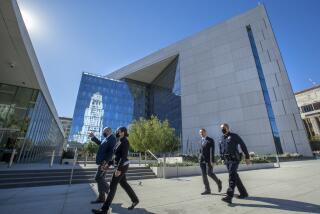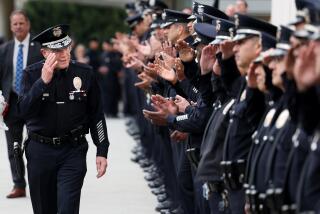The U.S.-City Police Reform Deal: Monument to a Year of Upheaval
Negotiations for an agreement between Los Angeles and the federal government over reform of the LAPD cut a wide swath through local government in 2000--and may prove the most lasting monument to a turbulent political year.
By the time the deal was struck, Mayor Richard Riordan and Police Chief Bernard C. Parks had argued over how long to fight it. Police Commission President Gerald Chaleff, already at odds with Parks, was further from him than ever, and also had drawn the suspicion of the mayor. Some council members were angry and defensive. Police morale was shaky.
The debate erupted when the U.S. Justice Department threatened to sue Los Angeles over what it alleged was a “pattern or practice” of civil rights abuses by local police, exemplified in such high-profile scandals as the 1991 beating of Rodney King, the widely publicized problems connected with the O.J. Simpson murder investigation and the horrifying revelations connected with the now notorious Rampart Division and its anti-gang unit.
Armed with that treasury of evidence, few experts believed the Justice Department would have much trouble beating the city in court if it pressed a lawsuit. Riordan, however, fought hard, first to call what he believed was the government’s bluff, later to improve the terms of the deal being negotiated.
“As mayor of the city of Los Angeles, I have often had tough days,” Riordan told reporters on Nov. 2, the day he finally gave in. “But I can think of none tougher than today.”
Among other things, the agreement pledges Los Angeles to beef up the LAPD’s Internal Affairs Division, implement a computerized officer-tracking system, give more power to the Police Commission and its inspector general and require the Police Department to keep statistics on the race and gender of the people it stops for traffic and pedestrian violations.
Anyone who violates it--including the mayor or chief--could be found in contempt of court.
More to Read
Sign up for Essential California
The most important California stories and recommendations in your inbox every morning.
You may occasionally receive promotional content from the Los Angeles Times.











